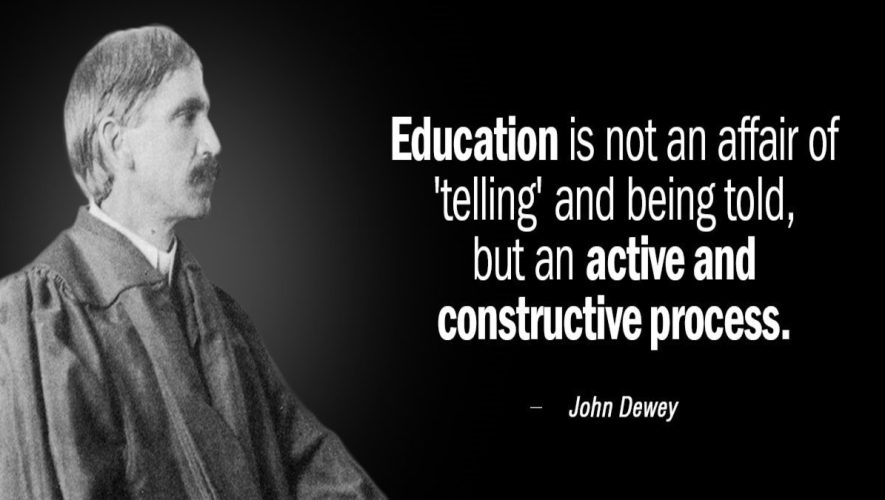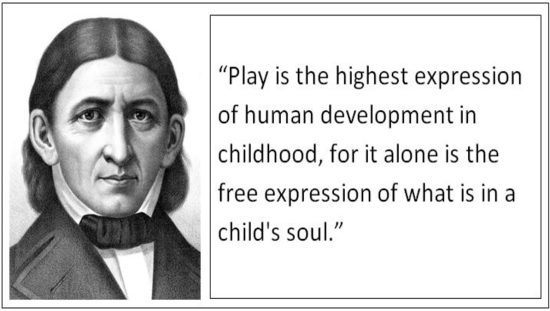Purpose and Method
John Dewey was born 1859. He was a pragmatist and experimentalist. He tested every hypothesis by its consequences. According to him:
- There is no absolute value, knowledge and reality.
- Action is real.
- Man is an active being.
- Man is capable of solving his problems through the logic of scientific method.
Dewey was of the view that the only reality is one’s experience of objects, physical and social surroundings around him. True knowledge increases through experience, the behavior can also be modified through experience which in turn affects the subsequent experiences of an individual.
Laboratory School
His philosophy was manifested in the shape of an experimental school at Chicago in 1896. It was known as the laboratory school. In this school no school subjects in the conventional sense were taught, instead, manual occupations related to life such as shop work with wood and tools, cooking and sewing were encouraged. Its program was in the form of activities such as play, construction, contact with nature, self-expression and use of tools etc.
According to the Dewey, school is a place where the child learns through his experience. His school is a social institution and it develops the child’s social consciousness and enables him to make use of his capacities and powers for school purpose.
Dewey’s Aims of Education
In the words of Dewey, “Education is the development of all those capacities in the individual which will enable him to control his environment and fulfill his responsibilities.” As Dewey was a pragmatist, so his aims of education are as follows:
- To make students socially efficient
- Education for continuous growth
- To enable the individual to adapt the environment
- To cultivate within the young one, the attitude and dispositions which are necessary for a continuous and progressive life in society.
- To direct, guide and control the born capacities of the child
- To enable the child to form habits and sentiments through which he can control his environment and his native impulses
- To reorganize the human experience in the light of present need and demands of the changing world
Dewey’s Method of Teaching
Dewey’s view on the method of teaching is in the line of his pragmatic philosophy according to which it should be based upon the principles of:
- Learning by doing
- Activity
- Purpose
- Connection with life of child
This method is to integrate the various subjects with the activities and experiences of the child. The method used for this purpose is that of trial and error or experimentation. It is also called as the problem solving or project method.
In this method student is confronted with a problem he works out the solution. If there is any danger or difficulty, the teacher helps him. In project method there are four steps.
- Determination of objectives
- Preparing the plan of action
- Practical implication of the plan
- Evaluation
Kilpatrick, one of the Dewey’s followers is of the views that Dewey had in the mind the following rules when he conceived the project technique:
- The students must proposed what they actually do,
- They should be allowed to do only those things which will build up certain attitudes
- All learning should be done only if it is necessary for what the students have actually proposed
- What the students are allowed to do should be guided so as to enrich the subsequent stream of experience.
Thus, in project method child’s interests and purposes are important, it deals with those intellectual processes that are antecedent to induction and deduction, interest and self-activity are its two major features.
OTHER RELATED POSTS




Very interesting to read you
Good luck to you
Thank you very much for the information provided
I’m very impressed
This is a definitely incredibly superior publish.
just came across this site and would appreciate the author for providing such useful educational resource. thanks!
Im extremely impressed along with your writing abilities and also with the structure for your blog. Is that this a paid theme or did you customize it yourself? Anyway keep up the nice high quality writing, it’s rare to look a nice blog like this one these days..
Great write up – I confess I have thought of some new entries for my own blog. Lots of interesting content here. Keep it up.
Thank you for the post on your blog. Do you provide an RSS feed?
Excellent post. Thanks pertaining to sharing these details. It’s really of great be an aid to me. From a person’s article, I know extra in this particular respect. I may continue paying attention to your write-up.
Discover the best and ever!
I cannot thank you enough for such great writing and all people to their up to the point reviews.
Thank you for the interesting information on Dewey. Very helpful on the format of the article.